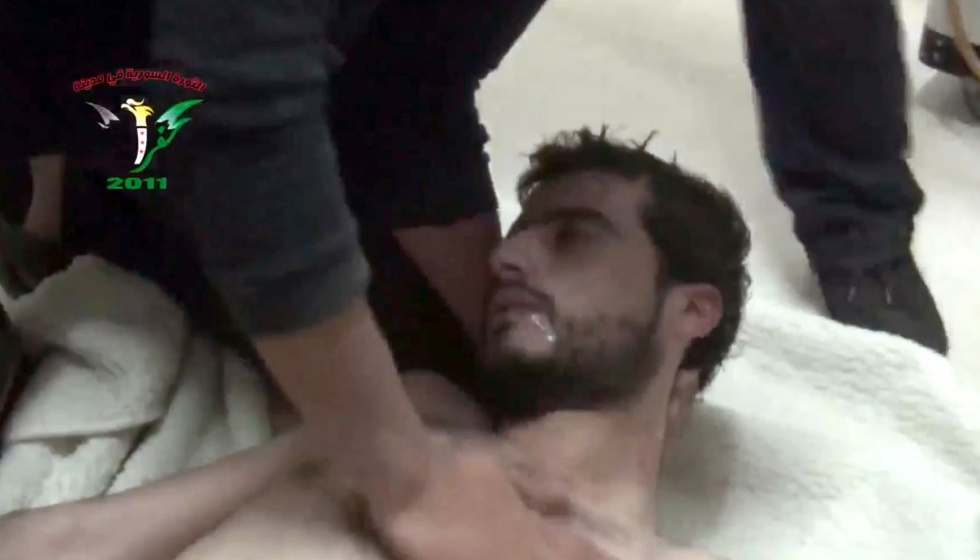Regime, rebels trade blame for new 'chemical' attack in Syria's Hama

An air strike in Hama province of central Syria caused "suffocation and poisoning", an group said Saturday, with opposition blaming Syrian government forces and state media accusing the rebels for the strike.
Elsewhere, fighting raged all day in Aleppo near an air force intelligence base, with the Syrian Observatory for Human Rights labeling it "the most violent since the beginning of the battle" in the northern city in mid-2012.
A bomb blast and shelling in areas of Damascus killed four people, the official news agency SANA reported.
In the rebel-held town of Kafr Zita in Hama province, residents choking from poisoning were hospitalised after raids with barrel bombs on Friday, the Observatory quoted medics as saying.
"Regime planes bombed Kafr Zita with explosive barrels that produced thick smoke and odours and led to cases of suffocation and poisoning," the monitoring group's head Rami Abdel Rahman said.
New MEE newsletter: Jerusalem Dispatch
Sign up to get the latest insights and analysis on Israel-Palestine, alongside Turkey Unpacked and other MEE newsletters
But state television said that al-Qaeda affiliate Al-Nusra Front, a key force in Syria's three-year armed revolt, had released chlorine in a deadly attack on the town.
"There is information that the terrorist Al-Nusra Front released toxic chorine... leading to the death of two people and causing more than 100 people to suffer from suffocation," it said.
"There is information that Al-Nusra Front is preparing to hit Wadi Deif in Idlib province and Morek in Hama province with toxic chlorine or sarin," the state broadcaster added.
Videos circulated by opposition activists on YouTube showed men and children in a field hospital coughing and showing symptoms of suffocation, while three young men are wearing oxygen masks.
'Chlorine smell'
In one video posted online, a man who appears to be a doctor said "the bombardment left a yellow-coloured product, and a smell like chlorine gas, wounding more than 100 people including women and children."
There was no independent verification of either of the claims made by state media or opposition activists.
The opposition and much of the international community blamed the Syrian regime for a chemical attack last August outside Damascus that reportedly killed as many as 1,400 people.
The government denied responsibility, in turn blaming rebels, but agreed under threat of US military action to turn over its chemical weapons stockpile for destruction.
In Aleppo, fierce fighting raged Saturday for the first time near a government intelligence centre in the Zahra neighbourhood, said Abdel Rahman.
He added that both government and opposition fighters had suffered "losses" and a large number of people fled the fighting.
Government warplanes pounded the nearby area of Lamrayun and the edges of the intelligence base.
The Observatory, which relies on a vast network of activists on the ground and medics for its information, said another 10 people were killed when Islamist rebels shelled regime-held areas of Aleppo, once Syria's economic capital.
More than 150,000 people have been killed in Syria since mid-March 2011, according to the Britain-based Observatory.
UN called on to investigate poisonous gas usage
The Syrian National Coalition for Opposition and Revolutionary Forces has called on the UN to initiate an urgent investigation into the usage of poisonous gas.
The Syrian Revolution General Council said Saturday that 10 people were killed in Aleppo that day by an attack by regime forces using “barrel” and “vacuum” bombs.
Meanwhile, the Local Coordination Committee of Syria said that regime forces attacked the suburbs of Damascus and the district of Kafr Zeita in Hama with poisonous gas on Friday.
The silence of the international community in the face of Syrian massacres gives a “green light” to the Assad regime, the coalition said.
Turkey’s Foreign Minister Ahmet Davutoglu, currently visiting Japan, on Saturday criticised the international community for failing to act in the face of last year's chemical attack near the Syrian capital of Damascus.
Speaking from Hiroshima, Davutoglu also accused the Syrian regime of using chemical weapons in August, adding there was evidence of gas attacks as recently as two weeks ago.
Middle East Eye delivers independent and unrivalled coverage and analysis of the Middle East, North Africa and beyond. To learn more about republishing this content and the associated fees, please fill out this form. More about MEE can be found here.

